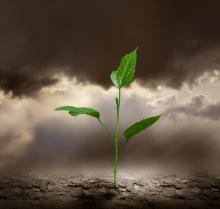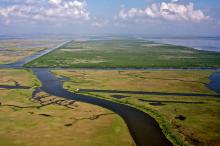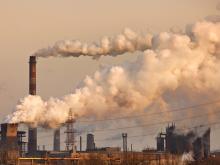Creation Care

Rest and renewal are hard to come by for any leader.
As such, there’s a week that I treasure each year for providing me with the deep replenishment I need to keep me going as I lead international creation care ministries. It may not be everyone’s idea of a good time, but for me it’s a balm that picks me up like no other—Duke Divinity School’s annual summer institute hosted by the Center for Reconciliation.
The first time I attended the institute in 2010, I limped in like a spent marathon runner crossing the finish line. After successfully rising to the challenges of the recently ended academic year, I was bone weary from the demands of leadership and ready for a week of recuperation and rejuvenation.
I was looking forward to being with like-minded leaders who implicitly understand my mission to educate Christian university students to “be agents of, and participants in, God’s shalom,” soaking in the wisdom from long time heroes like John Perkins, and participating in my selected creation care track led by Duke Divinity’s Norman Wirzba.
Salon reports on a new study which suggests that "fracking" can pollute water sources:
"A new study, published in the formidable Proceedings of the National Academy of Sciences, upends that common-sense argument. It shows that fluids may have traveled from deep within Pennsylvania’s Marcellus Shale, one of the formations at the center of the gas boom, into shallow aquifers hundreds of feet above. These fluids aren’t products of fracking, but if they can travel up through layers of rocks, close to the surface, it means that fracking fluids could, too."
Read more about the study here
According to the Atlantic Cities, lawmakers in North Carolina have chosen to ignore studies that show sea levels are rising faster than previously expected in favor of developing new housing along the coast.
According to the rerport, state Rep. Pat McElraft, a not-scientist, said in a floor debate that the state should assume sea levels will rise at the same rate they have in the past: 8 inches over the past century.
From Kelly Henderson's Switchboard blog post:
"The scientific findings that North Carolina coasts will likely experience a 39-inch sea-level rise created quite a stir and were challenged by NC-20, a coastal economic development group, who cited flaws in the research. The group fears losing dollars if coastal planning begins now to prepare for the 39-inch rise since over 2,000 coastal miles will become restricted to development."
And, from Mr. Colbert, on N.C.'s logic in only considering historical data:
"If we consider only historical data, I've been alive my entire life. Therefore, I always will be."
Sandi Villarreal is Associate Web Editor for Sojourners. Follow her on Twitter @Sandi.

In huge news last week that was largely overwhelmed by the Supreme Court ruling on health care, Washington came together to direct the Clean Water Act fines from BP's oil drilling disaster of 2010 to fund Gulf coast restoration and recovery.
Attached to the transportation bill that President Obama signed on July 6 was a provision called the RESTORE (Resources and Ecosystems Sustainability, Tourism Opportunities and Revived Economies) the Gulf Coast Act, which will send 80 percent of BP's eventual fines (likely somewhere between $4-$20 billion) to the five Gulf states and set up an ecosystem restoration council with joint state and federal leadership.
Faith communities should cheer this news for a couple of reasons. First, they asked for it. The legislation has been supported by many different faith-led efforts, such as a letter signed by over 140 religious leaders from Sojourners own Jim Wallis, Mitch Hescox of the Evangelical Environmental Network, and many clergy from around the nation. Local Gulf faith leaders spoke up as well, with the Louisiana Interchurch Conference passing a resolution calling on their member groups to support and lead efforts for Gulf recovery and the RESTORE Act.

Sister Kathy Long turned toward my 13-year-old daughter and asked one question: “What will you tell your friends about spending this month in Mexico?”
In a public park in Cuernavaca, Mexico, we sat on a concrete bench next to six women who chatted and stitched embroidery patterns with brightly colored thread.
I glanced toward the sewing group, realizing that Maya would have rolled her eyes if I had asked her that same question. An intrusive query from a mother seemed compelling coming from a Catholic nun who worked in Mexico, promoted justice amid poverty, and even spent three months in jail for protesting the military training of Latin American leaders in the U.S.
“I will tell them that rich people and poor people are all people in the end,” Maya responded. “If you have three cars and two houses, you are a person just like someone whose house is made of cardboard or metal.”
The Atlantic profiles a new documnetary called Bangladesh: On The Frontlines of Climate Change:

Please don’t sweat the 2,132 new high temperature marks in June — remember, climate change is a hoax.
The first to figure this out was Oklahoma Senator James Inhofe, who in fact called it “the greatest hoax ever perpetrated on the American people,” apparently topping even the staged moon landing.
But others have been catching on. Speaker of the House John Boehner pointed out that the idea that carbon dioxide is “harmful to the environment is almost comical.” The always cautious Mitt Romney scoffed at any damage too: “Scientists will figure that out 10, 20, 50 years from now,” he said during the primaries.
Still, you have to admit: for a hoax, it’s got excellent production values.

Church camp was in my blood, with an Episcopalian lineage that began when my grandfather helped to build and then direct Camp Bratton-Green in Mississippi. Every summer of her childhood, my mother was a camp brat, the outdoorsy, lanyard-loving equivalent of an army brat.
As a 16-year old, she met my father when he drove his family’s car from Hattiesburg, Miss., to pick up his sister Marcia from camp in Canton, Miss. And decades later, two of my siblings met their spouses at camp.
But let’s be clear: church camp in my family was more than an easy way to find a summer fling from the same denomination. While none of my crushes lasted beyond the summer, I gained a more enduring life-long commitment to God’s earth. Summer camp integrated me into a Christian community that sought to reconcile humans with creation.

The Colorado wildfires are raging this week. I’m in Denver, and the grey haze over the mountains in the distance gives me a sick feeling. Countless trees on hundreds of thousands of acres have gone up in smoke. Hundreds of homes have been destroyed. Even human lives have now been forever lost to the flames. It’s tragic, and it’s not over yet.
But here’s what I believe. One day, when these fires have been extinguished, this land will be restored. People will do whatever it takes to reforest these hills and rebuild their homes. In a few years, mountainsides that are charred and blackened today will be green again. We have the will and the resources to restore our environment when it has been destroyed.
Two weeks ago I was in Haiti. Unlike the deforestation that has happened in Colorado in a matter of days, Haiti’s 98-percent deforestation has happened over centuries. The destruction to Haiti’s natural environment is almost complete. Birds are rare. Small animals are almost gone. Fish that once teemed in the waters around the island are barely there.
It gets worse.
CHOOSING TO PAY more for a gallon of gas than the price at the pump sounds a bit crazy—but that is exactly what a couple of dozen members of the Community of St. Martin, a worshipping group of Lutherans, Catholics, Mennonites, and others in Minneapolis, Minnesota, have covenanted for more than a year. It’s one way they’re seeking to show commitment to environmental stewardship.
After committing to a voluntary “tax” rate (from $1 to $3 per gallon, depending on income), each community member keeps track of gas receipts. The Community of St. Martin (CSM) collectively decides in advance how their taxes will be spent each quarter. Every three months, the group gathers to write checks and conduct a lively discussion about changes in their gasoline usage habits. CSM borrowed the idea from a group in Goshen, Indiana, that started a similar campaign 10 years ago.
Why intentionally pay more for gas than it costs? According to CSM members, this is precisely the point: The price of gas in the U.S. doesn’t reflect the actual costs that U.S. society and the global community incur as a result of the country’s dependence on oil. Those costs include fossil fuel’s contributions to air pollution and global warming. Also hidden at the pump are the costs of U.S. strategies to maintain an inexpensive supply of oil, often through political or military interventions in oil-producing regions—not to mention $4 billion a year in tax credits and subsidies to Big Oil.
Sara Nelson-Pallmeyer, the group’s treasurer, says that “everyone is paying a different amount—from $10 to $385 per month. The fun part is that so far we’ve given more than $5,000 to organizations working on alternative transportation solutions and advocating for political change around climate-change issues.” She added that, ironically, “The real heroes of the group are the ones paying the least.”
JOIN ME IN your imagination for a few minutes in the high Andes. The bamboo that arches over us here—like the tree that arches over your yard or nearby park—is at this very moment taking the carbon you and other creatures are breathing out. It then reforms this carbon into carbohydrate, powered by solar energy and hydrated with water (photosynthesis). It is making sugar from that CO2. The plant then uses this sugar to provide the energy and materials for making all sorts of new substances.
For example, if I take a leaf from a plant (such as lettuce or kale) and chew and swallow it, it is transformed within me to produce materials for sustaining my life, powering my walking and speaking and writing. And from its use I release carbon dioxide, returning through this gas the very same carbon the leaf had absorbed through the stomatal pores on its surface and incorporated into the leafy food I ingested. To complete the remarkable carbon cycle, the carbon I breathe out is eventually taken up again by green plants that in turn produce food for humans, bugs, birds, and batrachians! (Let’s hear a doxology!) Without green plants, all human life perishes—and most other animate life as well.
Plants accomplish a myriad of activities out of our sight. Beneath lawns and gardens, forests and prairies, roots are moving water from the soil, pulling it up through stems into the leaves and back into the atmosphere. All forests, all trees, all vegetation—great movers of water—are constantly returning to the atmosphere water that had fallen as rain. It rises again and again within the thin fabric of the biospheric envelope and condenses into those white clouds you see above to fall down again to water the earth.
In the final part of its series on evangelicals and climate change, The Christian Post's Napp Nazworth writes:
"Global warming skeptics argue that while global warming activists say that reducing carbon dioxide emissions is necessary to protect the poor and vulnerable, the science is so iffy and the cost of control so high that money would be better spent on direct aid to the poor."

How do you know when someone has a Prius?
Don’t worry; they’ll tell you.
We got a Prius about four years ago, and immediately we bought into the hype about milking every gallon of gas for another tenth of a mile. We read the hyper-miler blogs about how to employ the gas and brake pedals most efficiently. We competed against each other for the best MPG. It was nerdy but fun, and we felt like we were doing something at least a little bit socially redeeming.
I haven’t seen the research, but I’m convinced that a significant chunk of the Prius’ reputation as a gas miser stems from the way its users are trained to drive it.

Last night I had the rare privilege of dining with the president of my alma mater, Luther College, as he accepted a well-deserved Climate Leadership Award from Second Nature on the college’s behalf.
While I’d met President Richard Torgerson a couple of times before at alumni gatherings, I hadn’t had the opportunity to talk with him about the extensive sustainability efforts that the college has undergone during his tenure. And there have been a lot of such efforts to discuss. Nor had I been able to ask him about his experience as an entomologist. I was keen to find out if his love for bugs was inspired by a great professor, as mine was by Dr. Kirk Larsen in the biology department at Luther. It takes a special person, after all, to get others excited about God’s creepy crawly little creatures and to use that excitement to launch a lifelong commitment to environmental stewardship.

I spend most of my days studying the natural environment. From that perspective, the answer is clear: God has given us the freedom and the ability to make choices. These choices have consequences. And one of the consequences of building in fire-prone areas (and suppressing natural fire patterns in those same areas) is that when a fire comes, there is a lot to burn.
In most cases, these fires are the result of a perfect storm: lots of vegetation, low humidity, dry, hot and windy conditions, and a spark, usually from a human source. In a place where fire is common, like the western U.S., these conditions all come together naturally every few decades or so.
But fires are intimately related to temperature, humidity, and rainfall. So it makes sense to ask—is climate change making these fires worse? Do our energy choices, which include burning coal and gas and oil and increasing levels of heat-trapping gases in the atmosphere, affect the risk of wildfire?

In a full vote Wednesday morning the Senate rejected a measure intended to roll back the Environmental Protection Agency's implementation of the Mercury and Air Toxics Standards (MATS), a rule that would limit mercury emissions from coal-burning power plants.
As Sen. Lamar Alexander (R-Tenn.) said, “We don’t want to make the Great Smokies the Great Smogies.”
For the past four years, we have heard angry cries and even threats over the government bailouts for big banks, the auto industry and others during this economic downturn. Senators and representatives have lost their jobs over these bailouts. Yet Congress has been giving special breaks and what amounts to subsidies to the coal-fired utility industry for more than 20 years. It’s not taxpayer money but the health and life of our children that is being spent.

T.J. Foltz has a recipe to help the world's poor: Take one part entrepreneurship, one part social media savvy and one part faith-based motivation. Fold in the world's largest retailer.
Then add water.
If every American spent $10 per year on his Humankind Water — less than they spend on Halloween candy — it would be enough to nearly eradicate the world's water sanitation problems, Foltz says.
Foltz, a former Christian youth minister, put out his first bottle of Humankind Water last October. The idea is to sell bottled water in a socially conscious way, with 100 percent of net profits going to fund clean-water projects in Haiti, Asia and Africa.
Writing for The Huffington Post, actor and environmental activist Robert Redford argues:
"Every year, around the world, almost one trillion dollars of subsidies is handed out to help the fossil fuel industry. Who came up with the crazy idea that the fossil fuel industry deserves our hard-earned money, no less in economic times of such harsh human consequence? We fire teachers, police and firemen in drastic budget cuts and yet, the fossil fuel industry can laugh all the way to the bank on our dime? Something doesn't add up here.
For Salon, Fred Pearce writes:
Saudi Arabians have grown colossally rich on the country’s oil reserves. They have grown used to the idea that petrodollars can buy them anything. But Saudis are waking up to the fact that all their wealth will count for nothing if they have nothing to eat. And — despite the conference tables heaving with French, Persian, American and Arab cuisine — that is a growing threat. “If we want our grandchildren to live as we are, we need to change now, or we will be like an African country in 50 years, asking for aid,” Adil Bushnak, a former member of the Saudi Supreme Economic Council, told me during a conference session I was chairing
Learn more here
Writing for The Huffington Post, Desmond Tutu, Archbishop Emeritus of Cape Town, a Nobel Peace Laureate and Chair of The Elders writes on why inter-generational dislogue is so important in tackling the big issues of the day:
For the sake of our planet, a conversation that needs to be heard is the one between generations, between elders and young people around the world -- and those who are in between.